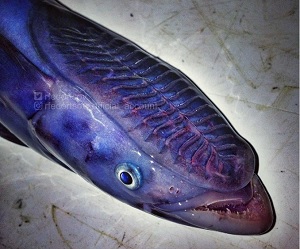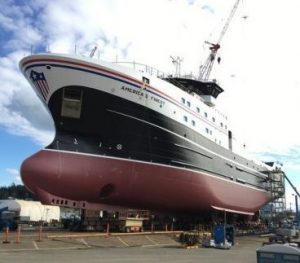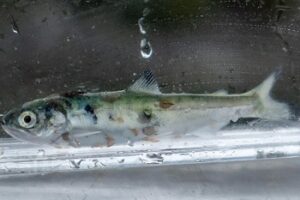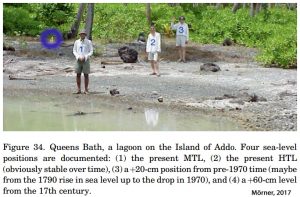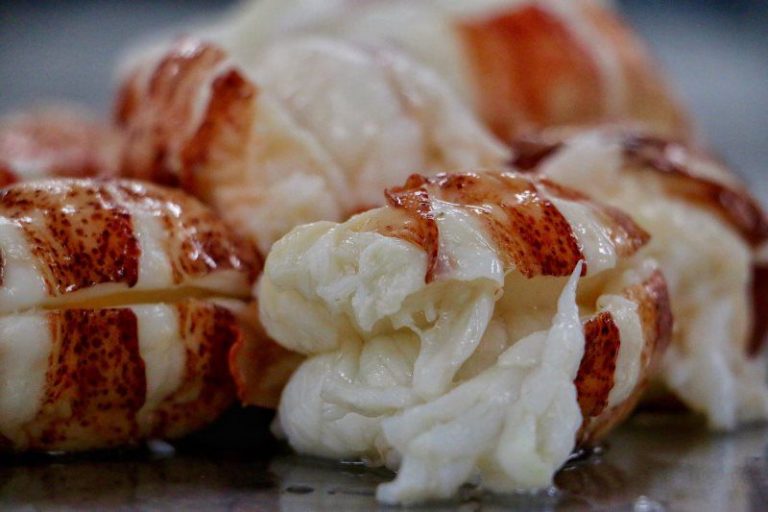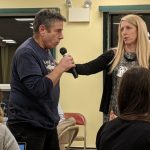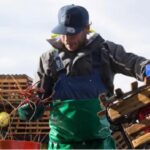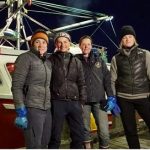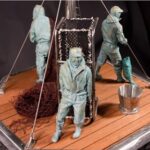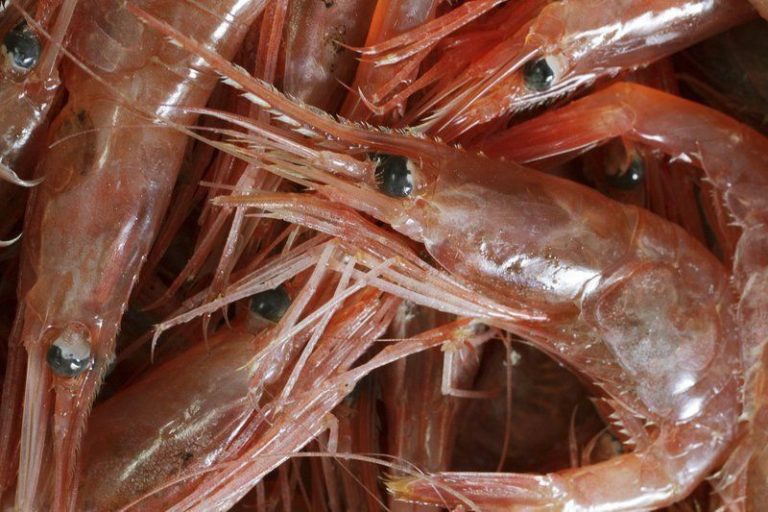Monthly Archives: November 2018
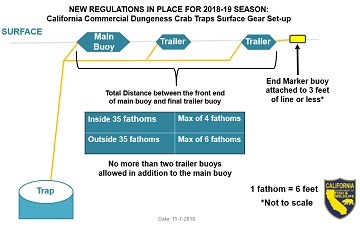
New regulations for commercial Dungeness crab fishery now in effect
The California Department of Fish and Wildlife enacted new regulations to reduce the risk of marine life entanglements in commercial Dungeness crab fishing gear. These regulations became effective on Oct. 30, 2018, and will be in place for the upcoming 2018-19 commercial Dungeness crab season. The new regulations allow no more than two trailer buoys to be used at the surface and establish a maximum distance between the front end of the main buoy to the tail end of the last trailer buoy depending on the depth that a trap is deployed. >click to read<11:34
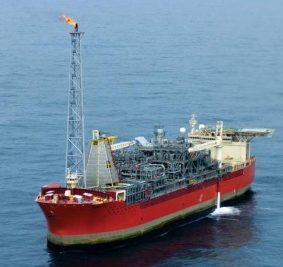
Offshore oil spill appears to be largest in Newfoundland history, effects still unknown
Officials were trying Monday to determine the impact of Friday’s estimated 250,000-litre oil spill — the largest in Newfoundland and Labrador’s history — in the White Rose offshore oil field. The oil is believed to have spilled from a flowline to the SeaRose floating production storage and offloading vessel (FPSO), which is stationed about 350 kilometres off the east coast of the Avalon Peninsula. If Husky’s estimate of the spill volume — 250 cubic metres, or 250,000 litres — is correct, the Canada-Newfoundland and Labrador Offshore Petroleum Board (C-NLOPB) has confirmed that it is the largest oil spill in the province’s history. >click to read<10:55
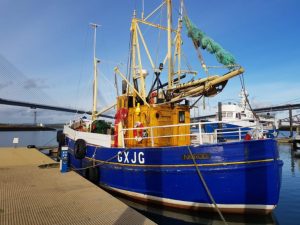
Arbroath trawler’s love boat past in sizzling Scacchi seafaring romp surfaces
The new owner of a historic Arbroath fishing trawler has discovered its love boat past in a steamy seafaring flick. More than six decades after being launched as the Murella from the slip of famous town boatbuilder Gerrards, the boat is now being toured by its current owner David McDermott. The unusual addition to the story of the boat is the latest layer of a remarkable history for the craft, which is thought to be the finest remaining example of her type. >click to read<07:56
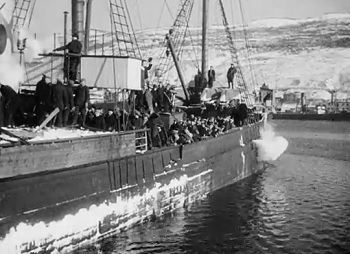
Varick Frissell: the New England Filmmaker Who Died in the Biggest Hollywood Disaster Ever
In 1930, Varick Frissell traveled north to Canada to make what would turn out to be the deadliest movie ever. Twenty-six people would die in the filming, including Varick Frissell himself. The film was a drama set aboard a fishing ship in White Bay in Newfoundland. It dealt with the friendship and rivalry of two men, one of whom is convinced he is a jinx. As the story plays out, the men must survive being marooned on the ice after their ship, the Viking, is destroyed during the Canadian seal hunt. >click to read< >click for video The Viking (1931)<
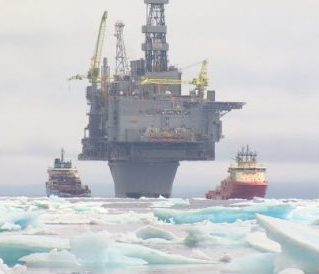
Poor weather prompts temp shutdown of all offshore rigs, preventing Husky clean up spill of 250,000 litres of crude
All offshore facilities have been temporarily shut down as a safety precaution due to stormy seas and will not resume operations until the offshore industry regulator says it’s safe to do so. The Canada-Newfoundland and Labrador Offshore Petroleum Board confirmed Saturday that the SeaRose FPSO, as well as the Terra Nova FPSO and the Hebron platform, had suspended operations just before bad weather hit. >click to read<16:53
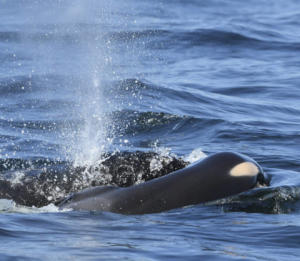
Orca task force gives recommendations to Gov. Inslee
The state’s Southern Resident orca task force on Friday released its final recommendations for protecting and restoring the region’s endangered whales. The task force submitted the recommendations in a report to Gov. Jay Inslee, who formed the 40-member committee by executive order earlier this year. The report focuses on 36 recommendations to help prevent the orcas from going extinct, according to a news release from the Puget Sound Partnership, the state agency that is coordinating the task force. >click to read<
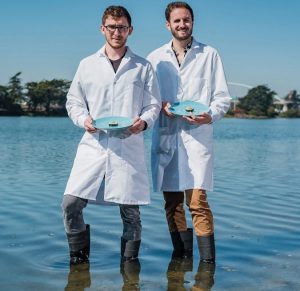
This biotech company is trying to grow bluefin tuna meat in a lab
For several years, biotech companies have been promising “clean” meat, “cell-based” meat, “cultured” meat – whatever you want to call it – as a way to enjoy the taste of chicken, pork and beef without the brutality of animal slaughter or the environmental damage of big agriculture. But what about fish? What about something as prized as buttery bluefin tuna, a delicacy that has become the forbidden fruit of the sea because of the many threats that have landed the fish on threatened and endangered species lists? >click to read<12:46
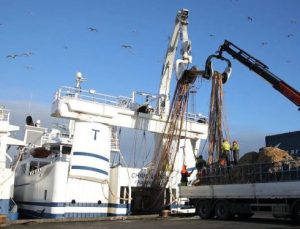
Brexit doubt and dismay replace optimism in fishing villages
Fishing communities were among the strongest supporters of the UK leaving the EU ahead of the 2016 referendum, but on Scotland’s north-east coast the Brexit wind is shifting. On a dark November morning in Peterhead, Britain’s largest fishing port, the optimism among fishermen and traders has been replaced by doubt and dismay. “I think we’ve been sold down the river once again. It’s an absolute disgrace. We trusted these politicians,” said Gary Mitchell,,,, >click to read<10:41
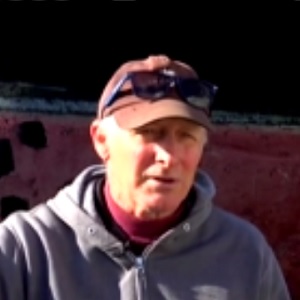
Oregon Crabber: ‘We’ll wait for a better price instead of going out fishing for less of a price’
Local crabbers are once again bracing for a problem they know all too well. The start of the commercial Dungeness crab season is being delayed until December 16 – at the earliest.,, Jeff Sober, a crabber of almost 40 years, said it happens frequently. He is always ready by December – but saves money just case. “We’re just going to be delayed. The season will happen eventually,” he said. “We do have a Christmas market. If we miss out on that, we’ll probably miss out on some money.” >click to read<19:38
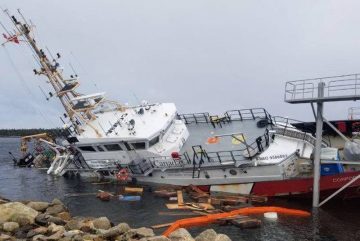
PHOTOS: Coast guard ship partially submerged after sliding loose at Sambro shipyard
A Canadian Coast Guard ship that was undergoing a scheduled refit in Sambro is partially submerged Saturday after coming loose overnight, and police consider the incident to be suspicious. The CCGS Corporal McLaren “was released from its secured cradle” at the Canadian Maritime Engineering Ltd. shipyard and slid down the slip, according to the coast guard’s Twitter feed. >click to read<16:57

Newfoundland skipper tried to throw woman overboard during fishing trip
Trent John White was convicted of aggravated assault, assault and damage to property in connection with incidents that occurred while he was skipper of a vessel participating in the 2017 turbot fishery. The 65-foot vessel had left Rocky Harbour for the Labrador Sea near Red Bay to take part in the fishery that summer. It was in the Strait of Belle Isle that White tried to throw the woman — who was also his girlfriend — overboard. Two other crew members who testified at White’s trial told the court they were in the wheelhouse when they heard the woman yelling; one of the men described it as a “desperate scream for help.” >click to read<09:39
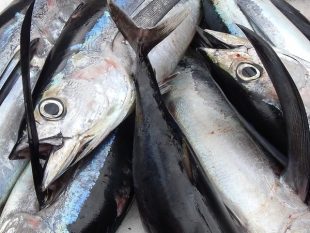
Two tough years for tuna Pacific Northwest fishermen
One skipper said it was his worst season in 15 years of fishing. Another classified it a “weird” year with scattered schools and undersized fish. For a second straight year, the news hasn’t been good for Oregon and Washington commercial tuna fisherman. According to official figures from the Pacific Fisheries Information Network (PFIN), commercial landings are down from the previous year, dropping significantly from the 10-year average in both states. August has historically accounted for a majority of the tuna caught in a given season, but this year substantial schools arrived later than anticipated, after a majority of commercial fishermen left or turned their attention to other fisheries. >click to read<08:45
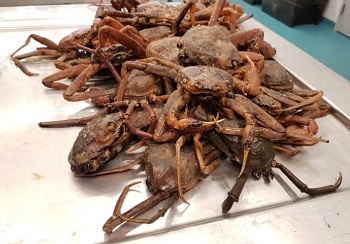
DFO warns 80% of N.L. snow crab are below fishable size
Eighty per cent of the snow crab in the province’s waters are now smaller than fishable size, and new biological research from the Department of Fisheries and Oceans says fishing pressure on the already strained stock is the main problem. “There is a major biological concern here,” said DFO biologist Darrell Mullowney.,, The news comes just as the Department of Fisheries and Oceans is set to meet with harvesters about snow crab in a series of meetings being held across the province between November 19 and 29. >click to read<19:44

About 250 cubic metres of oil spilled from SeaRose
Husky Energy’s SeaRose FPSO spilled oil into the Atlantic on Friday afternoon, just as it was preparing to restart production after Thursday’s high winds. Production was shut down during the storm on Thursday, Husky spokesperson Colleen McConnell said in an email to The Telegram. Shortly after noon Friday, the SeaRose experienced a loss of pressure in a subsea flowline as the crew was preparing to restart production, and that’s when the oil was spilled. >click to read<18:40
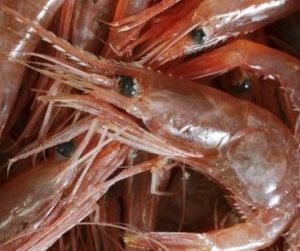
ASMFC block Northern shrimp harvesting for 3 more years
Citing continuing concerns that further fishing could drive the species to extinction, the Atlantic States Marine Fisheries Commission voted Friday to cancel not only the 2019 Maine shrimp season, but the 2020 and 2021 seasons as well. Commissioners from New Hampshire and Massachusetts supported the closure, while Patrick Keliher, commissioner of the Maine Department of Marine Resources, voted no, according to Tina Berger of the commission. DMR spokesman Jeff Nichols said in an email that Keliher would have supported a one-year moratorium. >click to read<17:59
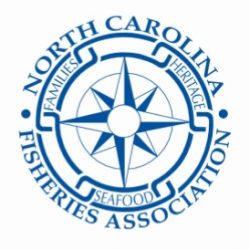
North Carolina Fisheries Association Weekly Update for Nov. 16, 2018
>Click here to read the Weekly Update<, to read all the updates >click here<, for older updates listed as NCFA >click here<16:12
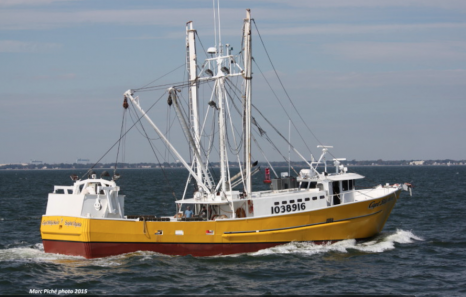
Fisherman Indicted For Murder Off Cape Cod
A federal grand jury has indicted a fisherman in the killing of another crew member on a fishing boat off Cape Cod, according to the U.S. Attorney’s office.,, Federal authorities say on Sept. 23, 2018, Meave Vazquez assaulted a crew member with a hammer in one hand and a knife in the other onboard the Captain Billy Haver, which was sailing 55 miles off the coast of Nantucket. That victim then saw that another crew member was lying on the deck bleeding. >click to read<12:45
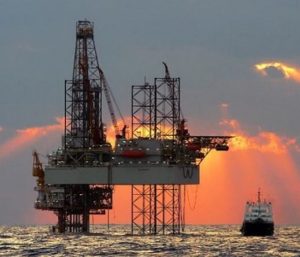
Australia: Seafood industry calls for Senate inquiry into seismic testing
Members of the Australian seafood industry are persisting in their calls for an inquiry into seismic testing, despite the Senate having twice rejected the idea. Seismic surveys, which are used to search for undersea oil and gas deposits, involve firing intense soundwaves into the ocean floor, which fishers worry could disrupt the behaviour of marine life. Southern Bluefin Tuna Industry Association President Brian Jeffriess said not enough is known about the impacts of the practice. >click to read<11:51
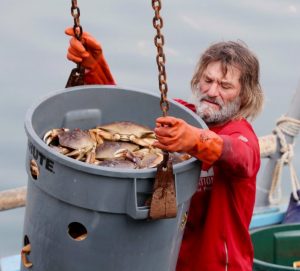
Fishermen head out on opening day of 2018 commercial Dungeness crab season
After several frustrating years of on-again-off-again crab catching operations along the California coast, fisherman were optimistic about hauling in a good catch as the 2018 commercial Dungeness crab season opened Thursday. It was three years ago that the highly anticipated season had to be delayed until March after state fishery officials detected toxic levels of domoic acid in crabs. In addition, fishermen have had to contend with scattered delays and lousy weather. >click to read<
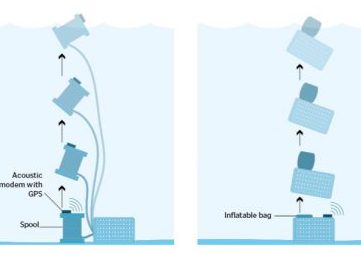
Ropeless lobster fishing? Stakeholders get a progress report
The Ropeless Consortium, a group of scientists and other interested stakeholders hosted by the Woods Hole Oceanographic Institution, met Nov. 6 to consider the prospects of ropeless fishing to reduce whale entanglements with lobster gear. “It was very cool to see how advanced the technology is and the many companies and groups working on development around the world,” Zack Klyver, lead naturalist for Bar Harbor Whale Watch, who attended the meeting, told the Mount Desert Islander. >click to read<10:30
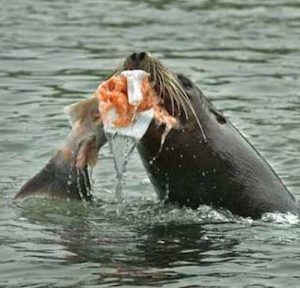
NMFS approves plan for state officials to kill sea lions at Willamette Falls
Protected under the Marine Mammal Protection Act, the state needed federal approval to take lethal action against the pinnipeds, which have been observed gorging themselves on endangered fish at the foot of the iconic waterfall. “This is good news for the native runs of salmon and steelhead in the Willamette River,” said Shaun Clements, a policy analyst for the state on the sea lion issue. “Before this decision, the state’s hands were tied as far as limiting sea lion predation on the Willamette River.” >click to read<22:52
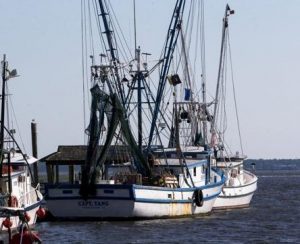
Shem Creek dock partnership in the works for Mount Pleasant
The town is opening negotiations to take a role in saving one of the last shrimp boat docks on Shem Creek, the picturesque tourism hub. Mount Pleasant Town Council this week voted unanimously for staff to move ahead “with due diligence” after receiving legal advice on the sought-after shrimp boat dock on Shem Creek. The discussion was held in an executive session, a meeting out of the public eye. >click to read<20:02
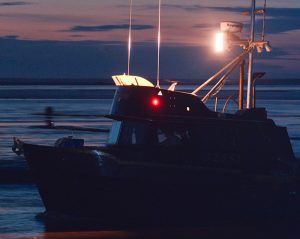
Upper Cook Inlet fishermen seek federal disaster declaration
This season was a sour one for salmon fishermen across the Gulf of Alaska, and participants in multiple fisheries are seeking funding for relief. The Board of Fisheries and Gov. Bill Walker already granted a disaster declaration for Chignik, which harvested next to zero sockeye salmon this year due to an unprecedented poor return to the Chignik River on the Alaska Peninsula. Sockeye salmon runs across the Gulf of Alaska failed to deliver this year, either in timing or in size, at a huge cost to fishermen. >click to read<18:17
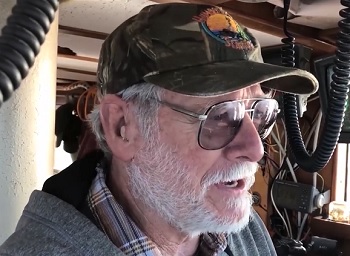
Reeling for Weather
Dave Bitts has been trolling the Pacific waters off the North Coast for decades. “I almost have been making a living out of it for 40 years,” said Bitts. The hum of Elmarue, his 45-foot fishing boat, is often dwarfed by the sounds of his chuckles and his enthusiasm for reeling in the catch of the day. Although semi-retired, Bitts finds any excuse he can to take his boat out on the water.,, Just a few minutes into the trip, Bitts airs his concerns about what he is not seeing. “We should be having big southerlies, big seas, and lots of rain this month. And it’s not happening,” said Bitts. >click to read<13:32
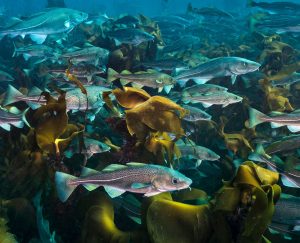
Oh, Give Me a Home Where the Wild Cod Roam
It took a week for Björn Björnsson to train 20 wild cod. In a compelling demonstration of classical conditioning, the aquaculture researcher at Iceland’s Marine and Freshwater Research Institute taught the fish to associate a low-frequency sound with a free meal. It only took another day for Björnsson—with the help of one of his trained fish—to teach another 19 wild cod. People might not think of cod as herd animals, but Björnsson says cod are adept at reading social cues to learn where to grab a bite. >click to read<12:10
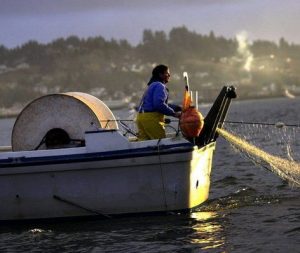
On the “Kitzhaber Plan” – Promises have not been kept
Until recently, the Columbia River gillnet fishery was a major economic driver in Wahkiakum County and the lower Columbia. The policy focused instead on recreational fishing priority, and has marginalized a fishery that sustained communities in our county and neighboring counties for 150 years. The result is that salmon have been transferred to a mostly non-local transient recreational fleet and away from local residents and economies. >click to read<10:05

Lobsterman back in court – Only $720 of $10K fine paid for illegal lobsters
When James A. Santapaola Jr. got nabbed landing 183 illegal lobsters at a local lobster wholesaler two years ago, the Gloucester lobsterman eventually cut a deal with prosecutors to plead guilty to 20 of the counts and pay two fines totaling $10,050. Now, nearly two years after the plea deal, Santapaola Jr. — who was arrested again last week on charges of possessing 47 illegal lobsters — has paid only $720 of the $10,050 in fines, according to the clerk’s office at the Gloucester District Court. ,,, The haul, according to law enforcement reports, included 28 undersized lobsters, 16 V-notched females and three oversized lobsters.>click to read<20:48
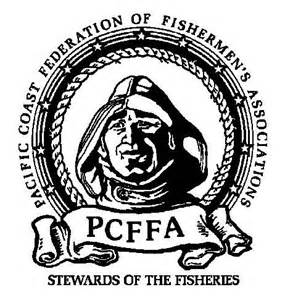
Crab Fishermen Sue Fossil Fuel Industry Over Climate Change Damage
Crab fishing on the West Coast has become so threatened by warming oceans that a coalition of commercial fishers has now joined the climate litigation fray with a lawsuit filed Wednesday to hold 30 fossil fuel companies accountable for losses caused by climate change. The lawsuit, filed in San Francisco County Superior Court by the Pacific Coast Federation of Fishermen’s Associations, seeks damages on behalf of crab fishers, their businesses and families, and local communities in California and Oregon. It describes losses caused by the closing of crab fishing waters over the past four years because of algae blooms in the warming Pacific waters, and warns that these closures will keep happening as warming continues. >click to read<19:31






